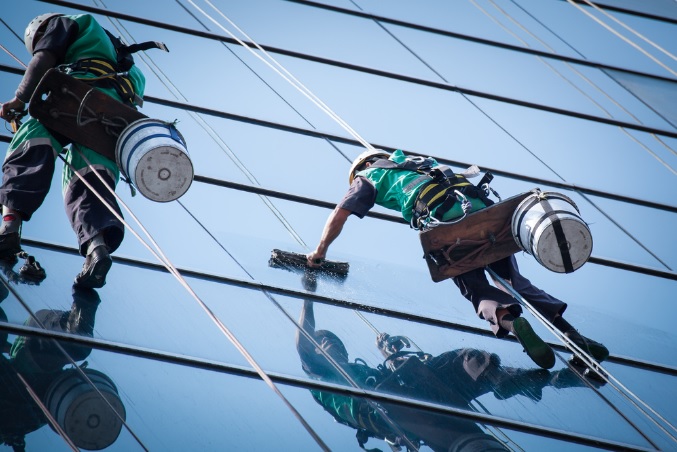Reasons façades of high rise buildings should be kept clean

Apart from making the building appear rundown and poorly maintained, there are some long-term problems you want to avoid. A high-rise building needs to have the façade cleaned to prevent dirt and grime from accumulating.
The problem is that dirt creates a sealing barrier on the facade. This prevents the building exterior from ‘breathing’, leading to issues such as water retention. Then there are issues caused by residues left behind by wind or rain. In the form of calcium and sulfates, these residues can create acidic conditions and salts on the façade. When they penetrate the façade, they cause the materials to deteriorate prematurely.
We’ve touched on a building’s appearance is essential, but this can translate into a real economic issue too. Property experts refer to ‘curb appeal’, the impression that potential buyers or tenants have when they look at the façade of a building. When it is clean and free from grime and stains, it instantly appeals more to them. Which means they will be willing to pay more cash for the investment.
How often do building facades need to be cleaned?
This is a tough question to answer because so many factors come into play. For example, a building that has not been cleaned for many years, or was previously cleaned poorly, may need frequent cleaning to achieve an acceptable result. If budget is an issue, discuss this with your contractor. There are options such as cleaning the facades more regularly than those that are not as obvious from the street. Be careful, however. Changes in temperature and humidity and exposure to contaminants between phased cleaning could lead to a banded look on the building.
Other factors your building contractor will consider include:
- the location of the building.
- exposure to contaminants in the air.
- the type of construction and materials.
Options for cleaning methods
The methods are usually used in combination to clean buildings. They include:
- high and low-pressure water
- detergents
- strippers/acidic cleaners
- spray bars and brushing
The contractor you choose to work with may consider doing a test patch before they start to determine the best choice for your building. What you want is the mildest solution, that is least likely to damage the façade.
Some of the options include:
WATER WASHING
This is a safe and straightforward option. Water is sprayed or misted continuously or intermittently. Water pressure and steam are also popular methods.
CHEMICAL CLEANING
A variety of chemical cleaners can be used when water alone won’t work. Detergents used with water provide gentle cleaning. For heavier soiling, acidic cleaners will be used.
ABRASIVE CLEANING
Abrasive cleaning mechanically scrapes, grinds, or blasts the surface with a dry or wet medium to remove dirt. They are harsher than water and chemical cleaning.
The frequency and cleaning methods will differ based on the material of the building. For example, more rigid materials like brick and concrete will require frequent applications of acidic restoration cleaners. Some types of moulded bricks need to be cleaned less frequently and with minimal intervention.
Pure water soaking, which is suitable in this case, is performed by attaching a soaking system. This is placed on the building’s façade at the rooftop. A low-pressure spray is administered for a couple of days and then is power-washed to remove dirt. A qualified contractor will ensure there is no water infiltration by monitoring the building’s envelope.
Cleaning graffiti off building facades
Graffiti requires specialised cleaning to get rid of it. A pressure-washer with chemicals to remove the paint on the exterior of a building will be used. Contractors may also use restoration paint strippers.
How much it costs to get your building cleaned?
Again this depends on the building facade being cleaned, how bad the contamination, and what’s causing it. These are some of the factors to discuss with your contractor when talking about a quote.
- the types of scaffolding and site protection required
- protection of surfaces around the surface such as windows and metalwork
- The management of water that contains chemicals or dirt
One thing that all experts agree on is that picking the right contractor is the most important aspect when you begin to explore the exterior cleaning of a building. To clean a high-rise building, you must make sure the company has done the same kind of work for other clients. Ask for references and details of their licensing and insurance.
If the contractor you want to work with can’t carry out any specialised activities, don’t risk asking them to complete all the cleaning work on your building. Ask if they also have the equipment needed to carry out the work safely you want to ensure they use the best option available. It could cost you more in the end if you don’t because high-pressure cleaning can cause severe damage if not undertaken correctly.










